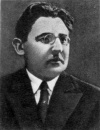April 1934
From The Space Library
The second issue of The Journal of the British Interplanetary Society is published. This issue has 22 pages. It features an opening article by German rocket pioneer Willy Ley. Ley gave a short background on the history of rocketry in Germany starting with Hermann Ganswindt and following through to experiments in the 1930s. It is the beginning of Ley's lengthy career in English as a historian of space flight. He referenced Goddard, Tsiolkovsky, and Oberth. He then described the birth of the German rocket society (VfR) by founders Max Valier and Johannes Winkler. Other names in the article include Fritz von Opel and V.W. Sander. He also mentioned Fritz Lang's movie Frau Im Mond, based on the novel by Thea von Harbou. A rudimentary description of the early Mirak and Repulsor rocket programs is followed by comments about Reinhold Tiling's winged rocket experiments. The accident that killed Tiling and his assistants Angelika Buddenbohmer and Friedrich Kuhr is said to have been caused by the detonation of 18 kilograms of rocket fuel. Philip Ellaby Cleator reported that the Germans had formed a new rocket society called E.V. Fortschrittliche Verkehrstechnik with a journal called Das Neue Fahrzeug. Guido Pirquet of the Austrian rocket society becomes fellow of the British Interplanetary Society.
The April issue of Practical Mechanics magazine features an update on the BIS meetings:
"THE BRITISH INTERPLANETARY SOCIETY REPORT MEETINGS were held on January 19th and February 2nd. At the former meeting the President, Mr. P. E. Cleator, had just returned from Berlin where he had been visiting the German rocket experts, notably Herr Willy Ley and Herr Nebel. During his stay he visited the Raketenflugplatz and was shown the experiments in progress, and given a description of the progress that is being 'made in the science of rocketry in Germany. Experiments, said Mr. Cleator, are being made on a very sound basis and with a view to their ultimate practicability. The results are tabulated, so that if eventually any exploit is contemplated there will be little difficulty in determining the factors involved. A list of rocket experts throughout the world was obtained from Herr Ley, and it Is anticipated that they will co-operate with the British Society. At the meeting on February 2nd, considerable progress was reported. Various technical journals had interested themselves in the' project of a rocket car, while much publicity had been given to the Berlin visit. Evidently the importance of this has been realised both from the point of view of co-operation in a common scientific object and also of international friendship. An informal talk was given by the Secretary on " The Mysteries of Venus and Mars, and led to considerable discussion. The Society was also informed of the very great possibility of a considerably bigger and better Journal. A notable addition to the membership of the Society is the famous French engineer, M. Esnault-Pelterie. This promises closer co-operation between the British, French and German engineers. Meetings continue to be held at 81 Dale Street, Liverpool, 2. The office is on the Second Floor, Room 15, and the meeting starts at 6.30 p.m. Meetings are held fortnightly on Fridays, every other Friday from February 16th, 1934. Leslie J. Johnson, Hon. Secretary."
British Interplanetary Society founding member N.E. Raymond Moore moves to London where he is science correspondent for the Daily Express newspaper.
Russian space writer Jakov I. Perelman of Leningrad is made honorary member of the British Interplanetary Society.
He From Procyon a science fiction story by American Interplanetary Society founder Nathaniel Schachner appears in Astounding Stories magazine.

